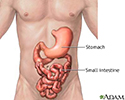Blind loop syndrome
Stasis syndrome; Stagnant loop syndrome; Small bowel bacterial overgrowth
Blind loop syndrome occurs when digested food slows or stops moving through part of the intestines. This causes an overgrowth of bacteria in the intestines. It also leads to problems absorbing nutrients.
Causes
The name of this condition refers to the "blind loop" formed when part of the intestine is bypassed. This blockage does not allow digested food to flow normally through the intestinal tract.
The substances needed to digest fats (called bile salts) do not work as they should when a section of the intestine is affected by blind loop syndrome. This prevents fat and fat-soluble vitamins from being absorbed into the body. It also leads to fatty stools. Vitamin B12 deficiency may occur because the extra bacteria that form in the blind loop use up this vitamin.
Blind loop syndrome is a complication that occurs:
- After many operations, including subtotal gastrectomy (surgical removal of part of the stomach) and operations for extreme obesity
- As a complication of inflammatory bowel disease
Diseases such as diabetes or scleroderma may slow down movement in a segment of the intestine, leading to blind loop syndrome.
Symptoms
Symptoms include:
Exams and Tests
During a physical exam, the health care provider may notice a mass in, or swelling of the abdomen. Possible tests include:
- Abdominal CT scan
- Abdominal x-ray
- Blood tests to check nutritional status
- Upper GI series with small bowel follow through contrast x-ray
- Breath test to determine if there are excess bacteria in the small intestine
Treatment
Treatment most often starts with antibiotics for the excess bacteria growth, along with vitamin B12 supplements. If antibiotics are not effective, surgery may be needed to help food flow through the intestines.
Outlook (Prognosis)
Many people get better with antibiotics. If surgical repair is needed, the outcome is often very good.
Possible Complications
Complications may include:
- Complete intestinal obstruction
- Death of intestine (intestinal infarction)
- Hole (perforation) in intestine
- Malabsorption and malnutrition
When to Contact a Medical Professional
Contact your provider if you have symptoms of blind loop syndrome.
References
Gan T, Evers BM. Small intestine. In: Townsend CM Jr, Beauchamp RD, Evers BM, Mattox KL, eds. Sabiston Textbook of Surgery: The Biological Basis of Modern Surgical Practice. 21st ed. St Louis, MO: Elsevier; 2022:chap 50.
Shamir R. Disorders of malabsorption. In: Kliegman RM, St. Geme JW, Blum NJ, Shah SS, Tasker RC, Wilson KM, eds. Nelson Textbook of Pediatrics. 21st ed. Philadelphia, PA: Elsevier; 2020:chap 364.
Review Date: 10/26/2021

















